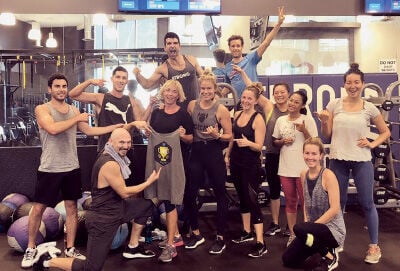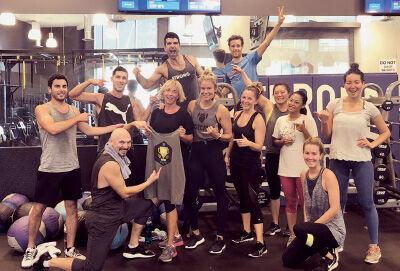Nick Swinmurn built his fortune at Zappos, the online shoe store he founded and that later sold to Amazon for $1.2 billion. But now the California-based startup wiz—who was once told no one would ever buy shoes without first trying them on—is turning his attention to the physical world of the fitness industry.
Basecamp Fitness, a high-intensity fitness concept, was founded in 2013 by Swinmurn and in October he sold it to Self Esteem Brands, the parent company of Anytime Fitness and Waxing the City. Since forming the entity five years ago, the Woodbury, Minnesota-based company has seen tremendous growth and began looking at other concepts to add to its portfolio.
"Basecamp emerged as the one that was different," said Jedidiah Schmidt, new brand president of Basecamp Fitness and former brand president for Provision Security Solutions, a Self Esteem brand that provides security for Anytime Fitness locations.
A smaller, high interval-focused concept that grew out of Swinmurn’s UFC involvement, Basecamp’s routine focuses on alternating between airbike and high-intensity floor exercises, each for 60 seconds. The entire workout usually takes about 35 minutes. "Basecamp is really designed for fitness enthusiasts," said Schmidt.
The workout was adapted from what UFC fighters credit for their cardio, Swinmurn said. Sponsoring UFC fighters through his former retail clothing company Dethrone, which is now owned by his brother, Swinmurn got to know some of the fighters and began observing their workouts.
He started doing these airbike intervals in a warehouse in California, with friends joining in to eventually grow the group to 10 to 12 people doing it three times a week. "People seemed to like it, so I thought I might as well try opening a gym," he said.
After opening the first five locations, Swinmurn decided franchising was the best path for the brand. After more than a year of discussions with Self Esteem, he realized other investors he’d met with didn’t have the operational experience and weren’t in the fitness industry. "The only way it could reach potential and get all the individual attention it needs was with Self Esteem," Swinmurn said.

Nick Swinmurn, above, is founder of Zappos and Basecamp Fitness, top photo, which he recently sold to Self Esteem Brands.
With the sale that closed last fall, Self Esteem Brands will be able to serve two very different consumer groups, explained Schmidt. While Basecamp is focused on those who want to get in and get out, with a fast-paced and intense feel, Anytime Fitness is on the opposite end of the spectrum. "Anytime is designed for a consumer who wants and needs help supporting their fitness journey," Schmidt said.
With a supportive environment and emphasis on coaching, Anytime will be kept "very separate" from the newly acquired Basecamp Fitness, according to Schmidt. The concepts even have different markets, with Basecamp tending to thrive in more urban areas. "We plan to keep them separate and grow them independently," he said.
The five existing Basecamp Fitness locations are in San Francisco and Los Angeles, and Self Esteem Brands plans to start its development efforts in the Twin Cities area of Minnesota. Schmidt explained the market was identified not only because of the proximity to Anytime Fitness’ headquarters, but because opportunity in the industry "rose to the top" in this area.
The intent over the next 12 to 18 months is to focus on two additional markets outside of California, open a handful of corporate locations to prepare the franchise model for sale, and then open up the concept to franchising in 2020, said Schmidt.
"We’ll do a handful of locations in the Twin Cities and then identify that second market," he said, describing this as the corporate strategy before the doors open for both domestic and international franchise opportunities.
While no specific international locations have been secured, Schmidt is confident in Anytime Fitness’ international strategy and franchising platform abroad. "We are analyzing a few different angles from an international approach," he said. "We haven’t necessarily identified where we’ll start, but we have industry experts in the international franchising space."
For Swinmurn, he said creating Basecamp has since caused him to shift his focus to building brands that provide real world experiences, as opposed to online conglomerates like Zappos. His restaurant concept, the nacho-focused Nachoria, is getting ready to franchise, and he also runs a company called Fated Brands. "I see it as a company that creates concepts that are hopefully repeatable," he explained.
Looking forward—past expanding Basecamp—Schmidt said Self Esteem is always looking for more partnerships and opportunities. "The industry is ripe for growth; we’re continuously looking for that right company," he said.



